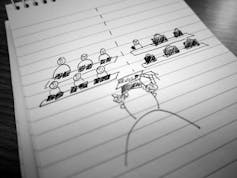I recently invited a top management consultant to give a guest lecture at my course at Copenhagen Business School. I went to sit among the students during the talk. They had been instructed to take notes, since the consultant was to be case material for their exam. Despite this, I watched a student sitting less than one metre in front of me spend almost the entire two-hour lecture on Facebook and private email.
During those two hours I painfully realised that something had gone devastatingly wrong in our contemporary attempts to uphold teaching and learning as distinguished and engaging activities.
A recent Scandinavian study showed that virtually all high-school students have their Facebook account open during classes. My own experiences and the considerable debate in Denmark that the publication of these experiences caused suggest that between 25% and 50% of the students in a given lecture at university are also present on social media. Even if we follow the most conservative estimates, the problem – at all levels of the global educational system – is tremendous.
The fact is that a large proportion of students are not mentally present during class. This then leaves the rest of the student group permanently distracted by those “leaving class” via social media: the tantalising Facebook logo popping up on some students’ screens will inevitable fuel everyone’s fear of missing out. The teacher is then left to the merciless competition with the social media for the students’ attention – a competition even the most gifted teacher will eventually lose.
Social media success
Senior professors occasionally insist that today’s students are lazier than their predecessors, but this is plainly wrong. Students work hard and, in the hours they spend in lectures, they create enormous amounts of value. The problem is that this is not value accredited only to their personal educational merits or their alma mater’s knowledge production. It also represents value for Facebook, a corporation already worth $200 billion.
A considerable part of this value is produced in lecture halls throughout the world. This contribution is critical for Facebook’s stock value, but the consequences for universities and their students are catastrophic: the loss of time and creativity is colossal.
A solid university degree, obtained through focused study, may potentially secure you a job. An armada of Facebook friends and thousands of updates on your timeline simply indicates how effectively your free labour is harvested by Facebook.
This is so much more baffling, as universities were built as places where time should not be wasted, but filled with creative work, an idea carried over from its monastic predecessors. At the monastery, time could not be wasted since time belonged to God: one needed to be ready, because God would return at any given time and claim it back.
Benedictine rulebook
The founder of one of the greatest monastic orders, Saint Benedict, realised this need for preparedness in a way still apt for today’s universities. The short form of his rule is ora et labora, roughly translated into “think and work” (it literally translates as “pray and work”). While modern-day universities allow for a great deal of “thinking”, they have downplayed “work” – that is, the intense focus on the production of tangible results such as reading difficult books, solving problems and coming up with new ideas.
The café culture of communicating freely and indulging in fantasy has moved into the university – invited, partly, by the desire of the modern corporate university to attract as many students as possible. Measuring university quality in terms of the number of graduates is part of this problem.
In trying to combat this, I have a few ideas, informed by St Benedict, the patron saint of students. His focus on “thinking and working” needs to be turned into a mantra relevant for modern students.
Laptop ban in action
Angered by the blue Facebook light, those ubiquitous and shiny white apples and the comatose students dominating the lecture hall, I worked with colleagues to come up with a set of Benedictine rules to try out. We enforced these rules in two courses at Copenhagen Business School’s Philosophy and Business programme this autumn.

First, attendance is mandatory in all classes, a practice hitherto alien to Scandinavian students. As we can’t yet formally punish failure to meet the rules, it is all still based on voluntary submission to them – just like in a real monastery. Furthermore, all students now need to equip themselves with nameplates and accept that they may be called upon by the professors at any time to answer questions or participate in discussions. On top of this, no laptops, iPads or smartphones are allowed during class. They may be consulted during breaks.
The immediate reception of the rules did include some surprised faces and one or two laptops closed very reluctantly. Yet the response by the time the first evaluation came around after two months was unison: “This course’s ban of computers is a tremendous relief!” From the professor’s perspective, the change in the lecture hall is palpable: students are now physically and spiritually present and seem to be relieved not to be contributing their labour to Facebook’s coffers any more. They are all ready to listen and partake, down to the last row.
A lot more experimentation and exchange of experiences is needed to counteract the Facebook invasion into higher education and so restore the university’s role as a place for both thinking and working. But the Rule of Benedict is one place to begin.

